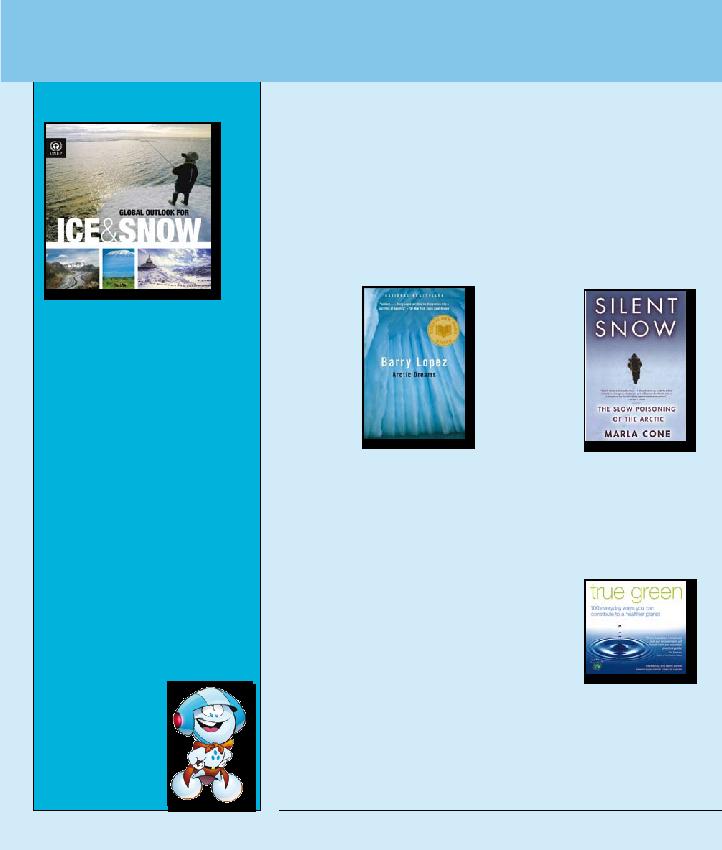
An accessible and comprehensive analysis of the
economic aspects of climate change, by the head of
the UK Government Economic Service and former Chief
Economist of the World Bank. Topics include the nature of
the economics and the science of climate change; its impact
on growth and development in both North and South; the
economics of cutting emissions and stabilising greenhouse
gases in the atmosphere; policy on mitigation and
adaptation; and the challenges of sustained international
collective action.
(Vintage Books USA
200 edition)
Still, one of the
finest books written
about the Arctic
-- as an ecosystem,
a home for its
indigenous people,
and a place of
beauty and mystery.
Travelling for five
years in the 980s in
the north American
Arctic between Davis Strait in the east and Bering Strait
in west, prize-winning author Barry Lopez accompanied
biologists, geologists, archaeologists and Inuit hunters as he
explored the region's history, wildlife, traditions and future.
The Editor-in-Chief of The International Journal of
Meteorology, himself an expert in storm and flood research,
describes the growing phenomenon of `extreme floods' and
provides insights into how, as the climate changes, water is
becoming humanity's greatest enemy.
M.J.Mace (The MIT Press, 2006).
Scholars in political science, economics, law, human
geography and climate science assess social justice issues in
adaptation to climate change, looking at the challenges of
ensuring that policy responses do not place unfair burdens
on already vulnerable populations. The book outlines the
philosophical underpinnings of different types of justice,
current inequities and future burdens in relation to climate
change, and applies them to examples of adaptation in
Bangladesh, Tanzania, Botswana, Namibia and Hungary.
w
w
.
- A Hot Topic?', reflects the close links between ice, snow
and climate change. Global Outlook for Ice and Snow gives
an authoritative, up-to-date assessment of the current
state of the cryosphere and the global significance of
changes -- now and in the years to come. Global Outlook
for Ice and Snow is the second thematic assessment report
in UNEP's Global Environment Outlook series and was
written by leading scientists from around the world.
the Arctic, tourism is already an important component
of the economies of the north. In the Antarctic, the
number of tourists landing on continental Antarctica
continues to rise sharply. There are serious concerns
that tourism is promoting environmental degradation
in the polar regions (especially in the Arctic) by putting
extra pressures on land, wildlife, water and other
basic necessities, and on transportation facilities. This
publication explains issues of relevance to polar tourism
and provides a selection of good practices for various
stakeholders. The publication builds on UNEP-UNWTO
2 principles on sustainable tourism development.
The trends and patterns of tourism in polar regions are
summarized and an agenda of policy implications
is identified.
and are carried around by Tilman the
Polar bear. They learn what happens
to Earth's protective shield, the ozone
layer, and its interlinkage with global
warming. They also meet some
scientists on the Tara expeditions boat,
which is drifting in the Arctic sea ice for
the duration of International Polar Year
2007-2008.
Implementing international agreements and national policies
on climate change is often derailed by a variety of barriers
at the subnational, local and -- perhaps most importantly
-- individual level. This book addresses these barriers, drawing
on original research from Sweden, a world leader in effective
environmental solutions. The issues include governance
structures, the relationship between `experts' and the public,
political feasibility, tax measures, perceptions of `fairness' and
self-interest, and the importance of environmental values.
(Grove/Atlantic
2006 edition)
Traditionally thought of
as the last great unspoiled
territory on Earth, the Arctic
is in reality home to some
of the most contaminated
people and animals on
the planet. Los Marla Cone
traveled across the Arctic,
from Greenland to the
Aleutian Islands, to find out
why the Arctic is toxic. Tons
of dangerous chemicals and pesticides from the United States,
Europe, and Asia are being carried to the Arctic by northbound
winds and waves and amplified in the ocean's food web. As
a result, Inuit women who eat seal and whale meat have far
higher concentrations of PCBs and mercury in their breast milk
than women who live in the most industrialized areas of the
world, and they pass these poisons to their infants, leaving
them susceptible to disease.
environmental challenges
we face can leave us feeling
powerless -- but we're not.
In `True Green', Kim McKay
and Jenny Bonnin, part of
the Clean Up Australia team,
suggest 00 small ways in
which you can make a big
difference, at home, in the garden, at work, while travelling or
in your community. Put on a jumper instead of the heater to
lower carbon emissions Switch off electrical appliances at the
power point -- and lower your energy consumption (and bills!)
Say no to plastic bags, and reduce waste. Take shorter showers,
and save water. Walk or cycle to your local shops, and reduce
pollution. Practical, positive and easy to use, True Green shows
how making simple changes in your everyday life can contribute
to a healthier planet. www.betruegreen.com"